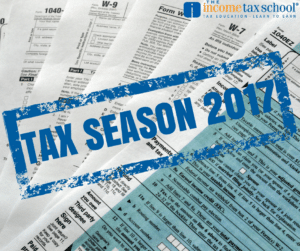The 2017 tax season is underway! There are many things that will affect our industry up in the air since 
As we move through the tax season, here are the things you need to know that apply to this year’s tax returns.
E-File
The IRS began accepting e-file returns on January 23rd. Some sections of Publication 1345 (Handbook for Authorized IRS e‑file Providers of Individual Income Tax Returns) have been updated, adding additional ID requirements that protect against fraud.
The IRS has been urging tax preparers to check on their PTIN and EFIN numbers through E Services to be sure that your numbers are not being used by someone else. —The E-Help Desk number is 866-255-0654.—
Refund Delays
The IRS will begin releasing EITC and ACTC refunds starting Feb. 15, but caution taxpayers that these refunds likely will not start arriving until the week of Feb. 27. The IRS wants taxpayers to know it will take additional time for their refunds to be processed and for financial institutions to accept and deposit the refunds to bank accounts. The IRS reminds taxpayers many financial institutions do not process payments on weekends or holidays, which can affect when refunds reach taxpayers. For EITC and ACTC filers, the three-day holiday weekend involving President’s Day may affect their refund timing.
Legislative Changes
There are lots of legislative changes to know about mostly thanks to The “Protecting America from Tax Hikes” Act or PATH Act. This bill mandates that the IRS not issue a refund on tax returns claiming the Earned Income Tax Credit or Additional Child Tax Credit until Feb. 15. This additional time helps the IRS stop fraudulent refunds from being issued to identity thieves and fraudulent claims with fabricated wages and withholdings. The PATH Act —also makes the expansion of Section 179 permanent and phases out bonus depreciations over 5 years.
Here are some other legislative changes, some of which are a part of the PATH Act.
Permanent Extensions
- Itemized Deduction for Sales Taxes
- Educator Expenses (the $250 above the line deduction for educators has been extended & now includes professional development expenses with the cap being indexed to inflation)
- American Opportunity Tax Credit Child Tax Credit
- Research Credit
- Tax-free distributions from individual retirement plans to charities (the Charitable deduction has been limited to $100,000 per year per taxpayer)
Temporary Extensions
- Bonus Depreciation (50% 2015-2017, 40%-2018, 30%-2019)
- Credits
- Exclusion for discharge of debt for primary residence
- Mortgage insurance premium deduction
- Tuition and fees deduction
- Alternative fuel and energy efficiency
- Theatrical production expenses (qualified film and theatrical production expenses)
Return Due Dates
The due dates for this tax year are:
- —January 31: W2 and 1099 Misc.
- —15th day of 3rd Month: Partnership (1065) & S Corporation (1120S) returns
- —15th day of 4th month unless June 30 year-end: C Corporation (1120)
- —April 18, 2017: 2016 Individual returns due
Due Diligence
The IRS takes due-diligence requirements very seriously and has been warning tax preparers to take it seriously as well. Make sure you are compliant on the following:
- Earned Income Tax Credit
- American Opportunity Credit
- Child Tax Credit and
- Additional Child Tax Credit
You should also make sure you are up-to-date on Form 8867 and the tax preparer penalties, which have increased.
Identity Theft
Identity Theft is a big focus for the IRS this season. Here’s a snippet of procedures they’ve changed.
- W2 verification code project expanded
- 16 digit verification code
- Enhanced Software password requirements
—Make sure you check out their Publication, “Protect Your Clients; Protect Yourself” as well as Publication 4557 Safeguarding Taxpayer Data.
READ: Protect Yourself and Your Clients from Cybercrime
We hope you have a great tax season! Stay in the loop by subscribing IRS Quick Alerts and following us here on the blog, on Twitter (@TaxSchool), Facebook, and LinkedIn.
source http://www.theincometaxschool.com/blog/tax-season-2017/
No comments:
Post a Comment